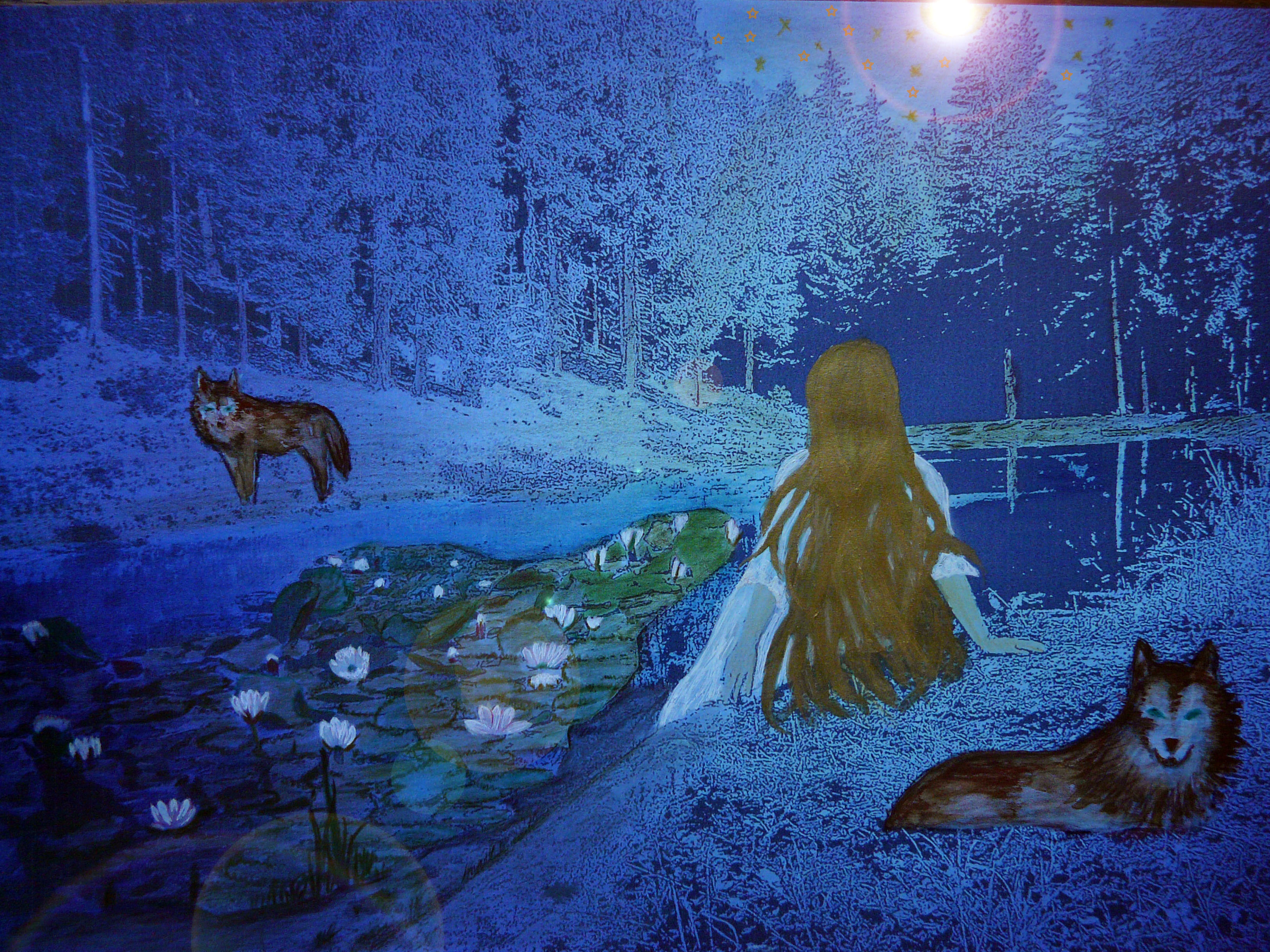Once
upon a time when Spirits still wandered
upon
the Earth and built their homes
under
waves or in large caves,
hiding
- people thought - their treasures,
the
woods of Vallorbe were the haunt,
where
long governed the might
of
good, lovely, wise women;
the
most beautiful they were of all.
They
sang with wonderful voices,
their
tresses were very goldenlike.
The
door of their cave was not secret,
but
it was done wrong to go in
and
was not forgiven ever
except
for a youngster once.
To Mortals they were visible
on
holy weeks, when they wandered
through
the treetangled vale
divided
by a river silver shining and swift.
"White
Maiden" was the women's name
given
them by the Mortals in town,
for
their true beings the raiment veiled
which
in white fell to the ground.
When
a difficult year drew near to the country,
one
of the White Maiden led
a
black sheep through the forested vale,
a
white one indicated a blessed year.
When
one of the maiden in the night
went
to swim among the water-lillies in a pool,
the
bank was protected by two wolves
in
order to turn people from the noble woman.
When winter wraped the whole country
in
a snow-white dream, cold, long,
White
Women came to the town
in
the night to search the gift of fire,
to
warm themselves beside the warm hearth
in
the forge whenever the place was empty.
Before
the Sun woke the smiths,
the
Beautiful Ones, unseen by mortals,
returned
to the caves with swiftness,
like
living long-haired stars (comets),
for
their blond, very long hair
was
caused to fly by their running.
Swift-footed was the youngster
and
known as a clever-fingered smith
whose
boldness and youth tempted him
and
on a bright morning caused him
to
cross the cave's dark threshold
behind
bushes in an uphill wood.
Through
the halls he wandered long,
where
long years after long years, eternally,
water
had shaped and decorated into rocks
uncountable
beautiful fay-caves.
A
bed of grass and leaves he then found,
very
tired from the walk he there lay down.
When
he was awake again, beside him stood a woman.
Her
voice was melodious and her words like honey:
"Donat,
stay in my cave
through
one long year with me and my sisters.
A
good part of our knowledge you will have.
Plants'
comfort you will learn,
and
the artful work with precious metals,
also
you will be very skilled with jewels.
The
goodness and knowledge that you will receive,
with
your everlasting oath you will pay back:
you
will not look for me in my dwelling,
our
meeting will happen by my will.
Abide
by the rules and two golden boxes
I
shall fill with daily gifts:
a
piece of gold and one pearl
on
behalf of every day in these caves."
Now, Donat stayed in happiness
through
a short time in fair June.
Every
meeting with the White Woman
in
the middle of the day was like a feast.
Tasty
food and festive mood,
what
a good thing was his life.
Hours
upon hours passed with swiftness,
loved
were the telling and singing.
And
yet, whenever he remained alone,
the
time was heavy on him wholly.
"Where
and how is the woman's room?",
he
asked himself and in order to see more,
Annawe
followed the woman in secret
to
her hidden room in an evening.
The
White Woman was asleep in a high vault
where
covered in green stood a stone.
There,
on this bed the woman was lying
in
dim light, in beauty and peace.
Her
raiment revealed one of her feet.
Behold!
Gooselike, they were made.
With fear, Donat, turned from the woman.
He
ran, heart beating, from the cave.
The
White Woman woke up and then understood,
that
betrayed she was and echoed
her
out-cry through the tall caves;
painful
and bitter were the words:
"Through
a very short time loyalty
has
been put to test and it is not long
your
oath has stood, oh, Donat!
Some
days more and to you marriage
would
have been the choice and part of everything:
the
knowledge, the power and of a treasure.
Go
now, return to the forge!
Return
to your life's tribulation!
Precious
things I have given you, you shall keep them.
Not
a word of the place where you've received them.
May
your choices be wisdom and peace,
otherwise,
your fate will be punishment."
Thus she spoke, then the light was gone.
The
smith searched his way touching with his hand
until
he found the cave's gate.
He
ran fast to the security of the valley.
In
town, the young man toiled again
and
the smiths asked questions on the place
of
his dwelling the whole time.
He
revealed all - the noble lover,
her
treasures, the gifts and similar things.
To
the tale he added abundant lies.
But
the smiths laughed - to make them believe
his
words, he wished to show the fruit
of
his journey beyond the cave's door.
He
opened the box and upon sand
now
his sight fell with horror.
Alas,
the smiths laughed more of him.
Donat
was despised from this hour
and
soon he turned from the country.
And
also from this hour, this country
by
the wise women forever was forsaken.
